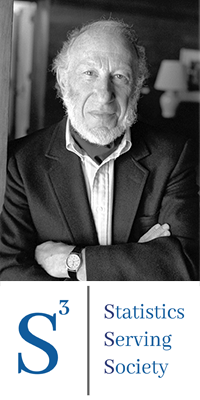[Please Note: This Ingram Olkin Forum session has already occurred. Go to the News Story for this event to read about what happened.]
Session Five: Coping with Information Loss and the Use of Auxiliary Sources of Data
In some studies disrupted by COVID-19, continued follow-up of existing patients and recruitment of new patients has not been possible, leading to smaller sample sizes and less complete information than had been planned. This session will explore methods to overcome such information shortfalls. One approach is to use short term endpoints to replace or augment the original endpoint. Another option is to make use of historical data and/or concurrent data from external sources. Our speakers will describe such approaches and outline the challenges they pose.
Registration:
There is no fee if you were on the program of an earlier session in this series, previously paid for the series ($75), you belong to a NISS affiliate (https://www.niss.org/affiliates-list, or you are a graduate student less than 6 years post Ph.D. If any of these cases apply - register by sending an email to officeadmin@niss.org. Otherwise, click the 'Register for this Event' button ($25/session).
Agenda
10:00-10:15 Introduction
James Rosenberger (NISS Director, Penn State University)
Nancy Flournoy (Chair of the organizing committee, University of Missouri)
Chris Jennison (Moderator, University of Bath)
 10:15-10:45 Nigel Stallard, (Warwick Medical School)
10:15-10:45 Nigel Stallard, (Warwick Medical School)
"Using short term endpoint data in interrupted clinical trials"
Abstract: While the SARS-CoV2 pandemic has led to the rapid initiation of an impressive number of clinical trials, it has also had a major impact on the large number of ongoing clinical trials in other disease areas. Interruption in the normal delivery of healthcare and the inability to invite patients for routine follow-up visits has led to many trials being stopped or temporarily paused.
The impact of the pandemic will vary from trial to trial, but some trials in chronic conditions will have a large number of patients already in the follow-up phase with some early outcome data for whom long term primary endpoint data are unavailable. This talk will consider ways in which these early outcome data may be used in the final trial analysis. Conditions in which a change of endpoint could be appropriate will be discussed together with methods by which the early endpoint data can be used to improve the estimation of treatment effects on the primary endpoint.
 10:45-11:15 Marc Vandemeulebroecke, (Novartis)
10:45-11:15 Marc Vandemeulebroecke, (Novartis)
"Mitigating “force majeure” trial disruptions by leveraging external data, with special reference to pooling approaches"
Abstract: The COVID-19 pandemic has disrupted normalcy of life, work and research on a scale that could not be anticipated. Clinical trials in particular have been facing a multitude of issues, up to being stopped prematurely. What could be viable strategies for mitigating this type of information loss by higher force? In this talk, I touch upon possible approaches that leverage external information. Special attention will be given to pooling approaches inspired by a real case study.
11:15-11:25 Break
 11:25-11:55 Heng Li, (FDA, NIH)
11:25-11:55 Heng Li, (FDA, NIH)
“Mitigating study power loss in disrupted clinical trials: Leveraging external data via propensity score-integrated approaches”
Abstract: Clinical trials may be disrupted by unforeseen events such as the COVID-19 pandemic. We discuss a practical procedure for salvaging those stopped studies for which restarting enrollment is not feasible, by integrating external patients with data already collected to recover the loss of study power due to premature stopping.
11:55-12:45 Break-out Room Discussions
Lisa Hampson, (Moderator, Novartis, Switzerland) 
 Sarah Zohar (Moderator, INSERM, France)
Sarah Zohar (Moderator, INSERM, France)
12:45-13:00 Synthesis and Next Steps
About the Speakers
Nigel Stallard is Professor of Medical Statistics and head of the Statistics and Epidemiology Group at Warwick Medical School, University of Warwick, UK. He has a first degree in Mathematics from the University of Cambridge and an MSc and PhD in Applied Statistics from the University of Reading, where he worked with John Whitehead in the Medical and Pharmaceutical Statistics Research Unit for ten years until moving to Warwick in 2005. His primary research interests are in the statistical design and analysis of clinical trials. In particular, he has worked on optimal trial design and on methodology for clinical trials with interim analyses and adaptations such as or subgroup treatment selection.
Marc Vandemeulebroecke is a Global Group Head in Novartis’ Analytics department. He has been supporting clinical development programs in early and late phase development across various disease areas as statistician and pharmacometrician. Marc holds a Maîtrise in mathematics from the University Paris XI, a Diploma in mathematics from the University of Münster, a PhD in mathematical statistics from the University of Magdeburg, and an MSc in PKPD modeling & simulation from the University of Manchester. He received the Gustav-Adolf-Lienert award from the German Region of the International Biometric Society (IBS). Marc’s interests range from adaptive clinical trials to effective statistical graphics, statistical and machine learning, and developing effective teams of statisticians.
Heng Li is a mathematical statistician team leader at the Center for Devices and Radiological Health, Food and Drug Administration. He joined FDA in 2002 and has been working in the area of cardiovascular medical devices.
Background of the series:
Many clinical trials that were under way in early 2020 have been disrupted by COVID-19. In some studies, it has been possible to adapt by monitoring patients’ progress remotely rather than through in-person visits. Session Five continues an Ingram Olkin Forum series that started with views from statistics leadership in US NIH and regulatory agencies. Following these introductory sessions, we focus on particular statistical methodologies that might contribute to statistical responses to unplanned clinical trial disruptions or provided a basis for the development of methods that provide a more appropriate response to this challenge. Topic specific sessions to date include Estimands and Missing Data and Randomization Tests. We are pleased to announce Session Five (Please click on the preceding links to catch up with this series).
Forum Organizing Committee
Jonathan Bartlett, University of Bath
Adam Lane, University of Cincinnati
Nancy Flournoy, University of Missouri
Chris Jennison, University of Bath
Assaf Oron, Institute for Disease Modeling
Sergey Tarima, Medical College of Wisconsin
Event Type
- Affiliate Award Fund Eligible
- NISS Hosted
- NISS Sponsored
Host
Sponsor
Location
Policy

